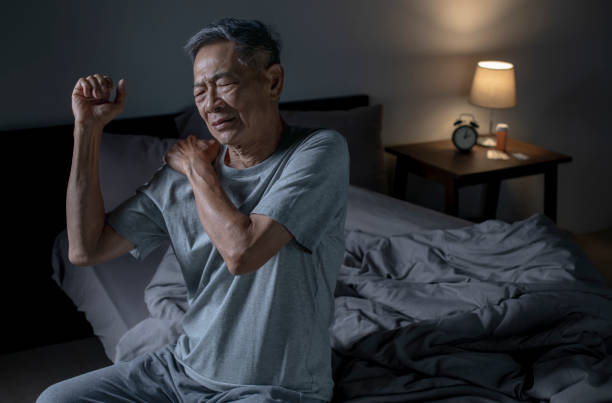Introduction

Living with Parkinson's Disease can be a challenge – especially at night. Not only is managing the physical and emotional effects of the condition difficult, but many people also struggle with pain and discomfort during the nighttime hours. People with Parkinson's may experience difficulty sleeping, restlessness, muscle cramps or spasms, or pain in the legs and other areas.
Fortunately, some strategies can help manage pain and discomfort during the night for Parkinson's Disease patients. This article will discuss some strategies, including medications, physical activity, relaxation techniques, environmental adjustments, and more.
What is Parkinson's Disease?
Parkinson's disease is a progressive neurological disorder caused by the loss of dopamine-producing brain cells. It affects movement, including speech, balance, and coordination, and can cause tremors, muscle stiffness, and difficulty walking. People with Parkinson's often experience sleeping problems due to pain or discomfort at night.
How Does Parkinson's Disease Affect Sleep and Pain?
Parkinson's Disease (PD) is a progressive neurological condition affecting movement. Common symptoms of PD include tremors, rigidity, bradykinesia (slowness of movements), and postural instability. Pain can be an additional symptom for some individuals living with PD.
While the cause of pain in Parkinson's disease is not entirely clear, research suggests that it is likely caused by a combination of factors, including motor fluctuations and rigidity, anxiety, depression, sleep disturbances, cognitive decline, muscle imbalances, and neuropathy.
Pain can have a wide range of adverse effects on the quality of life for those with PD. Not only does pain interfere with the patient's ability to perform activities of daily living, but it can also impact the patient's sleep quality. Sleep disturbances are common in people with PD and may include difficulty falling asleep, waking up during the night, experiencing nightmares or vivid dreams, or feeling excessively tired during the day.
10 Strategies for Managing Pain During the Night in Patients with PD

Various strategies can help people with Parkinson's disease manage their pain and discomfort during the night. These include:
Exercise
Regular exercise is important for managing Parkinson's-related symptoms, including pain and discomfort during the night. Consider engaging in low-impact yoga, tai chi, and gentle stretching to reduce stiffness and pain.
Relaxation Techniques
Relaxation techniques can help reduce muscle tension, pain, and other symptoms associated with Parkinson's. Relaxation exercises such as progressive muscle relaxation or mindfulness meditation can help to bring peace and comfort during the night.
Heat Therapy
Applying heat to the affected area effectively eases muscle stiffness and discomfort at night. A heating pad or warm bath can be used to help reduce pain.
Massage
Massage has been shown to offer relief from a range of symptoms associated with Parkinson's, including pain and discomfort during the night. Ask your doctor or care provider for recommendations on massage techniques that might provide relief.
Avoid Alcohol and Caffeine
Avoiding alcohol and caffeine before bed can help reduce discomfort at night. Both substances can interfere with quality sleep, leading to increased pain and discomfort.
Sleep Hygiene
Establishing a regular sleep schedule is an important part of managing symptoms associated with Parkinson's. Going to bed and waking up simultaneously daily can help your body adjust and reduce nighttime discomfort.
Adjust Your Mattress
Ensuring your mattress is comfortable, supportive, and adjusted to the proper height can alleviate pain and discomfort during sleep. Consider using a memory foam mattress or an adjustable bed to create a more comfortable sleep.
Keep Bedroom Cool
A cool bedroom help to reduce nighttime discomfort caused by Parkinson's symptoms. Keeping the room at a temperature between 60-67°F is optimal for creating a sleep environment that will encourage restful, pain-free sleep.
Use Support Pillows
Placing support pillows around your body can help reduce nighttime discomfort. Support pillows can provide extra comfort to the areas of your body most affected by Parkinson's.
Talk to Your Doctor
Finally, talking to your doctor about any pain or discomfort you are experiencing at night is important. Your doctor can provide additional strategies for managing your symptoms and helping you get a good night's sleep.
With these strategies and other lifestyle changes, people with Parkinson's disease can find ways to reduce pain and discomfort during the night. If you are struggling with nighttime pain or discomfort, talk to your doctor about the various strategies you can use to help manage your symptoms.
Use of Analgesic Agents to Manage Parkinson's Related Pain
Analgesic agents can be an effective way to manage pain and discomfort associated with Parkinson's Disease. There are a variety of strategies that patients and their caregivers can use to help reduce these symptoms at night. Here are some of the most common analgesic agents used in managing pain related to Parkinson's:
-
Non-steroidal anti-inflammatory drugs (NSAIDs): NSAIDs are medications that reduce pain and inflammation. These can include aspirin, ibuprofen, naproxen, and others. They can help reduce muscle stiffness often associated with Parkinson's Disease and other types of pain.
-
Acetaminophen: This medication is effective in reducing pain and fever. It can be taken orally, intravenously, or rectally. Acetaminophen can be useful in reducing the nighttime discomfort associated with Parkinson's Disease and other types of pain.
-
Opioids: These medications are used to treat severe pain, including that caused by Parkinson's Disease. They work by blocking the signals to the brain that cause pain. These medications are typically prescribed for short-term use and should always take as prescribed by a doctor.
-
Muscle relaxants: These medications help to reduce muscle spasms and improve sleep quality by relaxing the muscles. Examples of muscle relaxants include cyclobenzaprine, tizanidine, and baclofen.
-
Anticonvulsants: These medications help to reduce the frequency of muscle spasms. Examples include carbamazepine and gabapentin.
-
Antidepressants: These medications treat depression and pain due to Parkinson's Disease. They can also reduce the frequency of tremors associated with Parkinson's. Examples include tricyclic antidepressants, SSRIs, and SNRIs.
Using a combination of medications and other strategies, such as physical therapy or lifestyle changes, it is possible to manage pain related to Parkinson's Disease at night. Be sure to talk to your doctor if you have any questions or concerns about these strategies.
Using analgesic agents can effectively manage pain and discomfort associated with Parkinson's Disease at night. Common medications include NSAIDs, acetaminophen, opioids, muscle relaxants, anticonvulsants, and antidepressants.
Adjusting Timing or Dosage of Evening Medications

Parkinson's disease (PD) is a progressive neurological disorder that can cause pain and discomfort, especially at night. Adjusting the timing or dosage of evening medications may help alleviate some of these symptoms.
In many cases, taking the last dose of most PD medications earlier can help reduce nighttime discomfort and improve sleep quality. As PD medications mimic the body's natural dopamine production, working with a healthcare professional to identify the ideal timing for taking these drugs is important.
In addition to adjusting the timing of medication, Parkinson's patients may also benefit from reducing their dosage in the evening hours. Taking lower doses of medications later in the day may help reduce unwanted side effects and minimize the impact of night-time symptoms.
As with any medication adjustment, it is important to speak with a doctor or pharmacist regarding dosage levels, as each patient's needs will vary.
Finally, PD patients should consider incorporating lifestyle changes that can help promote improved sleep hygiene and overall health. This includes avoiding stimulating activities such as television or computer before bedtime, limiting caffeine intake, and ensuring that bedrooms are dark and comfortable.
In addition, relaxation techniques like deep breathing and progressive muscle relaxation may help reduce pain and discomfort throughout the night.
Discussing Combination Therapy with a Physician
When managing pain and discomfort associated with Parkinson's disease, a combination of therapies is often the most effective approach. This will often involve working with your physician to determine the best treatment.
Combination therapy might include medications, physical or occupational therapy, lifestyle modifications such as yoga or mindful meditation, and assistive devices.
Your physician will evaluate your current symptoms, medical history, lifestyle, and preferences to determine the best combination of therapies for you. Medications such as dopamine agonists or levodopa-carbidopa combinations may be prescribed to help manage pain and discomfort during the night.
Physical therapy can help reduce pain and rigidity, improve mobility, and maintain flexibility. Occupational therapy can help to reduce tremors and increase function in activities of daily living.
In addition to medications and therapies, lifestyle modifications such as yoga or mindful meditation can also help manage symptoms. They can help to relax your body, decrease muscle tension, promote better sleep, and reduce stress.
Assistive devices such as walkers or canes may also be recommended to help you keep your balance during movement.
Your physician will work with you to determine the most effective combination of therapies that best fits your lifestyle and preferences. It is important to discuss any questions or concerns you have about medications and therapies with your physician before starting a new treatment.
By working with your doctor, you can develop an individualized plan to help manage pain and discomfort during the night in Parkinson's disease.
FAQ's
What are two strategies that have been successful in managing pain?
Two strategies that have been successful in managing pain are adjusting the timing and dosage of medication and incorporating lifestyle changes such as yoga or mindful meditation.
How do you sleep at night with Parkinson's?
To sleep at night with Parkinson's, it is important to adjust the timing and dosage of medication under the guidance of a healthcare professional. Additionally, lifestyle modifications such as avoiding stimulating activities before bedtime, limiting caffeine intake, and ensuring bedrooms are dark and comfortable can help improve sleep hygiene.
What is the best sleep aid for Parkinson's patients?
The best sleep aid for Parkinson's patients will depend on the individual. It is important to speak to a healthcare professional about medications, lifestyle modifications, and assistive devices that may help with improved sleep hygiene. Also, relaxation techniques such as deep breathing or progressive muscle relaxation can help manage symptoms.
Why can't people with Parkinson's sleep at night?
People with Parkinson's may experience difficulty sleeping at night due to pain and discomfort, medication side effects, or changes in their daily routine. Additionally, physical or emotional stress can also interfere with sleep. Speaking to a healthcare professional about strategies for managing pain and discomfort during the night is important.
What is the most popular Parkinson's treatment?
The most popular Parkinson's treatment is combination therapy, which typically includes medications and physical or occupational therapy. Other strategies for managing pain and discomfort at night may include lifestyle modifications such as yoga, mindful meditation, and assistive devices.
What device stops tremors in Parkinson's?
Assistive devices such as wrist splints or weighted utensils can help to reduce tremors in Parkinson's. Additionally, medications such as dopamine agonists and levodopa-carbidopa combinations can also be effective in managing symptoms. Speaking with a healthcare professional about the best treatment plan for you is important.
Conclusion
I hope this post has provided helpful information about strategies for managing pain and discomfort during the night in Parkinson's disease patients. It is important to speak with a healthcare professional about medications, lifestyle modifications, and assistive devices that may be beneficial. By working together with your doctor, you can develop an individualized plan to best fit your lifestyle and preferences.

